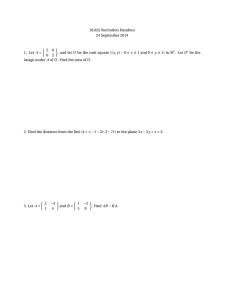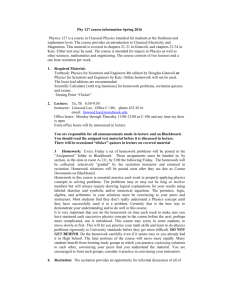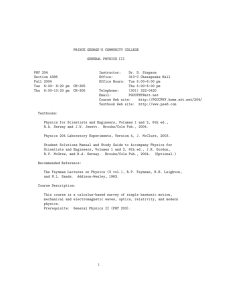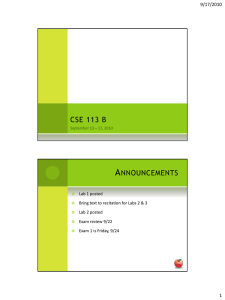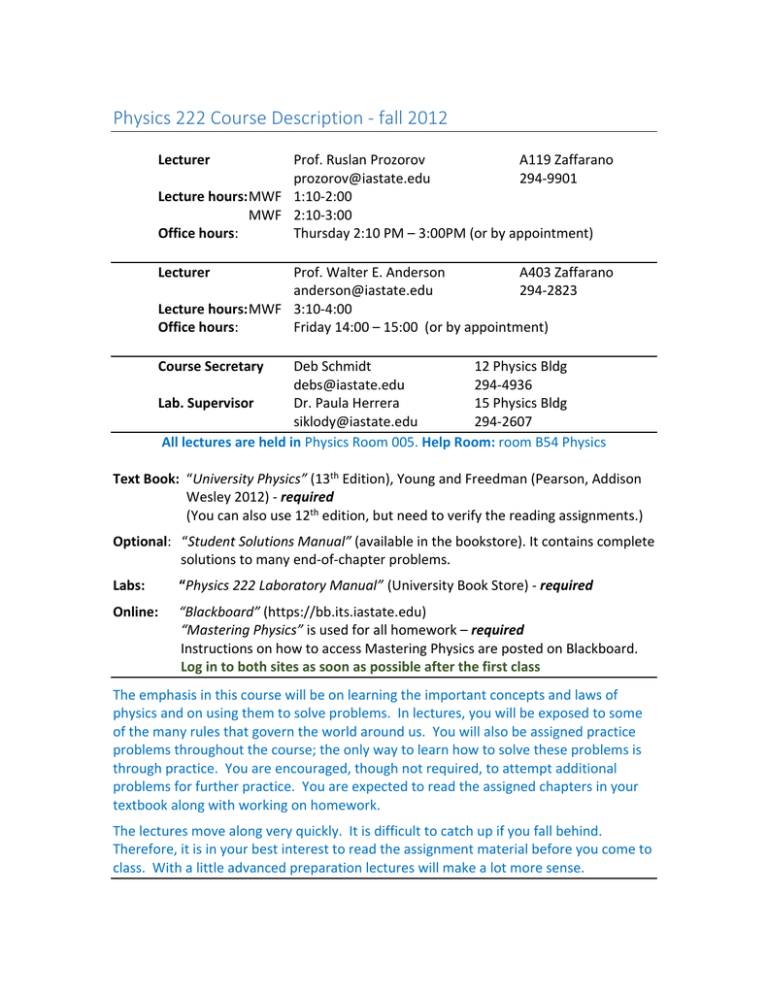
Physics 222 Course Description - fall 2012
Lecturer
Prof. Ruslan Prozorov
A119 Zaffarano
prozorov@iastate.edu
294-9901
Lecture hours: MWF 1:10-2:00
MWF 2:10-3:00
Office hours:
Thursday 2:10 PM – 3:00PM (or by appointment)
Lecturer
Prof. Walter E. Anderson
A403 Zaffarano
anderson@iastate.edu
294-2823
Lecture hours: MWF 3:10-4:00
Office hours:
Friday 14:00 – 15:00 (or by appointment)
Course Secretary
Deb Schmidt
12 Physics Bldg
debs@iastate.edu
294-4936
Lab. Supervisor
Dr. Paula Herrera
15 Physics Bldg
siklody@iastate.edu
294-2607
All lectures are held in Physics Room 005. Help Room: room B54 Physics
Text Book: “University Physics” (13th Edition), Young and Freedman (Pearson, Addison
Wesley 2012) - required
(You can also use 12th edition, but need to verify the reading assignments.)
Optional: “Student Solutions Manual” (available in the bookstore). It contains complete
solutions to many end-of-chapter problems.
Labs:
“Physics 222 Laboratory Manual” (University Book Store) - required
Online:
“Blackboard” (https://bb.its.iastate.edu)
“Mastering Physics” is used for all homework – required
Instructions on how to access Mastering Physics are posted on Blackboard.
Log in to both sites as soon as possible after the first class
The emphasis in this course will be on learning the important concepts and laws of
physics and on using them to solve problems. In lectures, you will be exposed to some
of the many rules that govern the world around us. You will also be assigned practice
problems throughout the course; the only way to learn how to solve these problems is
through practice. You are encouraged, though not required, to attempt additional
problems for further practice. You are expected to read the assigned chapters in your
textbook along with working on homework.
The lectures move along very quickly. It is difficult to catch up if you fall behind.
Therefore, it is in your best interest to read the assignment material before you come to
class. With a little advanced preparation lectures will make a lot more sense.
EXAMS
This course has two midterm exams
(see, http://www.registrar.iastate.edu//exams/nitexam.html)
Thursday, September 27, 2012 at 8:15 – 10:15 PM (covers lectures 1 – 15)
Thursday, Nov 1, 2012 at 8:15 – 10:15 PM (covers lectures 1 6– 29)
Final exam (120 minutes) covers ALL lectures and includes laboratory questions
The date and time of the final exam will be announced when they become available.
Room assignments and instructions will be posted on Blackboard and discussed in
advance of each exam. Exams are multiple-choice. Approximately 1/3 of the problems
will stress understanding of the physics concepts, whereas the remainder will be
numerical problems to test ability to apply these concepts.
Material to bring to exams:
a number 2 pencil,
a scientific calculator. Programmable and/or graphing calculators are not
necessary but may be used. Laptops, PDA’s and iPads are not allowed.
your student ID card.
Each exam will include the values of any physical constants you may need, a
formula sheet and scratch paper. The master formula sheet is also posted on
Blackboard
You may choose to create your own formula sheet. Show it to the instructor
before the exam.
Make-up exam:
A single, end-of-semester, make-up exam will be allowed only in exceptional
circumstances, such as illness, family emergencies (not anniversaries, family
vacations, etc.), or official university-sponsored activities.
You must bring proper documentation (doctor’s notice, university official notice
etc) and show it to the lecturer
Students who know in advance that they will miss an exam as a result of one of
these university-sponsored activities must explain the circumstances to the
lecturer well before the exam and seek permission to take a make-up exam.
After the fact, such permission will not be granted.
Students who miss an exam because of illness or other unforeseen emergencies
should send a message (by phone, voice-mail, e-mail, or through a friend) to the
lecturer or the course secretary before the start time of the exam in order to
receive permission to take the make-up exam. Proper documentation will be
needed to validate the absence.
The make-up exam will be held during the week before finals week and will be a
comprehensive exam.
Only one exam can be made-up in this manner.
HOMEWORK
Homework is given online on “Mastering Physics” and is computer graded.
Problems are due before end of the day on Saturday.
You are limited to 5 attempts per question
Multiple questions: 20% will be deducted per incorrect answer
Using the Hints is not penalized.
Late submissions receive no credit
You can rework completed assignments after the due date for practice. This
work will not be saved and will not affect the grades.
NOTE: working in groups on homework is OK, but copying answers from others,
internet or other sources is NOT OK and will be monitored
RECITATIONS
There will be a 50-minute recitation every Tuesday.
The recitation sections in this course are conceived of as hands-on / interactive
activities. Discuss, sketch, ask, explain, disagree, and think aloud… Anything except
sitting back and waiting for the instructor to solve the problem on the board. Your
instructor is there to help you through the problems, to answer your questions and to
monitor your understanding of the material. Learning is achieved by doing, not by
watching.
At the end of the semester, recitation instructors will give each student a score out of 10
points based on attendance, participation and attitude.
QUIZZES
Each recitation will include a 10 minute quiz
The quiz is based on material of two previous homework assignments.
Quizzes are graded by the recitation TA and handed back to the students at the
next recitation.
Missed quiz: If you miss a quiz and have an excuse (e.g. being sick, being away
due to an ISU sponsored activity), you should bring some document to prove the
reason of your absence to your TA who will give you an Excused Grade (i.e., at
the end of the semester your score for the missed quiz will be the average of all
of your other quizzes).
LABS
Information about labs (policies, grading, schedules) is posted in the lab portion of
Blackboard. For more information contact Lab Supervisor.
The importance of the recitation and laboratory classes cannot be over-emphasized.
You will not understand the material in this course if you cannot apply it to the solution
of the assigned problems. The laboratory is essential to your efforts to understand the
experimental foundations of physics as well as of scientific instrumentation. Questions
based on recitation and laboratory classes will appear on the mid-semester exams as
well as on the final exam.
GRADING
Percentage breakdown
Concept
Evening exam 1
Evening exam 2
Final exam
Recitation
Homework
Laboratory
Points
20 %
20 %
30 %
10 %
5%
15 %
TOTAL
100 %
Initial scale for letter grades
Total score
85 %
75 %
65 %
55 %
< 55 %
Letter grade
A- or better
B- or better
C- or better
D- or better
F
A failing course grade (F) will be given if:
any laboratory has not been satisfactorily completed, or
the student has engaged in any form of academic dishonesty.
Homework scores: Homework is an investment –the “direct” credit from homework
is only 5% of the final score, but this is the most important learning tool in the
course. Homework is your opportunity to make mistakes and obtain from them the
knowledge that you will need to answer the exam and quiz questions correctly.
Recitation and lab scores: The precise number of recitation/lab points you receive
from your instructors during the semester will not necessarily be the same as the
number that counts towards your final grade. Some instructors grade "hard" during
the semester and some grade "easy". Thus, in the interest of fairness to all the
students, scores for hand-graded material may be corrected at the end of the
semester to compensate for these differences. This means you will not automatically
get a higher grade because you have an easy grader, or a lower grade if you have a
hard grader.
Grade book: You should regularly check that all your scores are correctly entered in
the online grade book on Blackboard. It is your responsibility to bring any problems
to the attention of your section instructor immediately.
Exam scores: If you believe there has been an error in the grading of an exam, you
need to bring this up to your recitation instructor, preferably before the exams are
handed back in recitation. You and your recitation instructor should then contact
lecturers no later than one week after the results are released.
STUDENTS WITH SPECIAL NEEDS
If you have a documented disability and anticipate needing accommodations in this
course (for lectures, recitations, labs, or exams), please see me as soon as possible. You
will need to request that a Disability Resources staff send a SAAR form verifying your
disability and specifying the accommodation you will need.
HOW SHOULD I STUDY FOR THIS CLASS?
Keep up with the class! In physics, the material often builds upon what was
covered the week before. If you start falling behind, do something immediately.
Be sure to read the indicated reading assignments before each lecture. The
reading assignments are essential to understanding the material presented in
the lecture. A second reading after lecture helps cement key ideas into place.
Solve problems! It is the single most important activity in a physics class. If you
cannot solve the problems, you did not really understand the concepts. In
addition to homework, recitation is devoted to problem solving. Redo (without
looking at the solution) the examples shown in lecture.
Be honest to yourself: if you solved a problem without really understanding why
what you did worked, it is a waste of time (chances are that you just got lucky).
Understanding is key.
Check the solutions posted online. Be sure you understand all of the concepts as
well as steps associated with each problem.
Complex problem solving requires order: Always work with a pencil and paper,
and be neat, even if the problem does not need to be turned in. When problems
involve many steps and concepts, it is easy to get lost if all you have is a
collection of numbers randomly scattered on a sheet of paper. Do not try to do
calculations in your head unless they are trivial. Label quantities in a meaningful
way (don’t call everything x!) Keep your work for future reference (see next
point in this list!).
Learn from your mistakes: focusing on your mistakes is the most effective way of
identifying misunderstandings, weak areas, etc. Keep a list of the problems you
missed, or did not completely understand, or simply struggled with. Make sure
that you understand the solution, and make sure that you understand why what
you did was wrong! A few days after all this, try to do the problem again.
As needed, review the appropriate sections and/or go over your lecture notes.
Solve extra questions and problems in the textbook (the odd numbered
problems have the answers in the back of the book). A detailed solution manual
is available for purchase.
Join a study group. You will benefit both from other students’ insight and from
how explaining something to another person tests and refines your
understanding of a topic.
But be careful: being able to follow a problem solved by another person is not
the same as being able to solve it on your own! Group work should always be
followed by some individual work.
Use the help room. This is the perfect time to get one-on-one time with an
instructor.
STUDENT ASSISTANCE
There are several opportunities for students to receive assistance with the material of
this course:
Room 83 Physics is the help room for Physics 222. It will be staffed with the
courses’ TAs. The schedule will be posted on the door and online.
Instructor office hours.
The course web page.
Discussion board on Blackboard.
SI sessions for Physics 222 (times to be announced by the SI instructors).
It is to your advantage to work with other students to learn the material. This
can often help you to do better on the exams and homework. We encourage you
to work together and perhaps form a study group. You may meet in the help
room, if you wish.
You are not required to memorize countless equations and formulas. The
emphasis will be on using these equations, not memorizing them.

